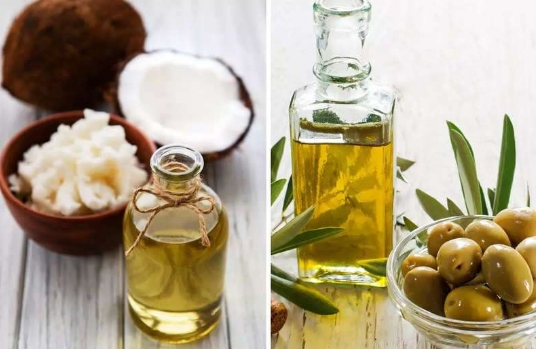Lifestyle
Coconut oil vs. Olive oil: Which is healthier for the heart?

If you’re concerned about your heart health or are caring for someone with a heart ailment, then it is crucial to choose heart-healthy foods.
Even while picking your cooking oils, you should be well-informed and aware of the harmful components present in certain oils.
The American Health Association (AHA) recommends switching to oils that have low saturated fat and high amounts of monounsaturated and polyunsaturated fat, which are also known as healthy or ‘good’ fats.
The role of healthy fats
According to the AHA, there are four major dietary fats in the food.
The ‘bad fats’, which comprise saturated and trans fats, tend to be more solid at room temperature (like butter), whereas monounsaturated and polyunsaturated fats tend to be more liquid (like canola oil).
As opposed to unhealthy saturated fats, good fats help lower blood pressure and cholesterol levels in the body, hence, reducing the risk of heart disease and stroke. It also lowers triglycerides associated with heart disease and fights off inflammation.
Some of the good sources of ‘good’ monounsaturated fat are: olive, canola, peanut, and sesame oils.
How healthy is olive oil?
Olive oil is an extremely healthy cooking oil. Derived from olives, it is very low on saturated fat, and extremely rich in good fats (monounsaturated fats), while containing other essential nutrients.
The healthy cooking oil is said to contain 14% of saturated oil, 11% of polyunsaturated, such as omega-6 and omega-3 fatty acids, and 73 % of monounsaturated fat. The predominant fatty acid in the olive oil is called oleic acid, which helps reduce inflammation.
Furthermore, olive oil also has large amounts of antioxidant properties that may reduce your risk of chronic diseases.
Does coconut oil stand a chance against olive oil?
Just like how olive oil is extracted from olives, coconut oil is extracted from coconuts. It is a tropical oil that is said to have several health benefits.
From having antimicrobial effects to fastening the process of fat burning, coconut oil can prove beneficial in many ways on an individual front.
However, when put against olive oil, coconut oil may not stand a chance, especially in terms of health and nutrition. The latter is generally classified as saturated fat, a type of unhealthy fat that is said to increase heart disease risk. It is said to contain 80 to 90 percent saturated fat, which means a tablespoon of coconut oil contains about six times as much saturated fat as olive oil, as per experts.
Coconut oil vs. olive oil: Which is heart-healthier?
When it comes to heart-healthy cooking oil, olive oil is much better than coconut oil and many other oils used in cooking.
In short, olive oil lowers LDL (bad) cholesterol and one’s risk of heart disease, unlike coconut oil, which has high saturated fat – known to increase heart disease risk.
Olive oil is also a part of balanced diets like the Mediterranean diet, which reduces the risk of type 2 diabetes and certain cancers.










